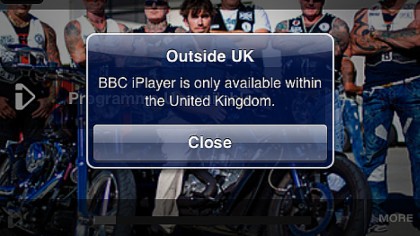The reasons why geo-blocking must be stopped
Geo-blocking keeps prices artificially high

Sign up for breaking news, reviews, opinion, top tech deals, and more.
You are now subscribed
Your newsletter sign-up was successful
Despite the global nature of the internet, we are all victims of geography. Netflix US has content before Netflix UK, the BBC iPlayer and Hulu are available only to those in the UK and US respectively, and internet shopping is hugely restricted. Welcome to geo-blocking, which makes the internet regional, and the free market anything but.
What is geo-blocking?
"Geo-blocking is simply the act of restricting access to websites and downloading applications based on the user's location," says Henry Thomas, Senior Web Developer for Postcode Anywhere, a company with over 10,000 international customers that offers web services and software to lookup UK and international addresses. "It could also include displaying different services and prices depending on someone's location."
It's why it is very difficult to buy an iPhone from Apple's website in Spain, stream a movie available on Netflix in Sweden from the UK, and why adverts are targeted at users depending on where they live. Consequently, no-one ever gets told the cheapest price, only the cheapest local price – cue Google's shopping pages, which are available only by territory, not worldwide.
Why is geo-blocking bad?
We are now living in a global village that's supposed to resemble a level playing field – a single digital market would empower businesses and boost growth in the global economy. "Consumers should be able to purchase products anywhere at any time, which is exactly what they are demanding," says Dan Wagner, CEO and founder of international commerce specialist Powa Technologies.

He continues: "As much of the world heads towards a cashless economy, which is being spearheaded in Nordic regions, a single digital market is the only logical answer … there is no reason that somebody should not be able to buy a product from a website in a different country when the world is so connected."
What is the EU proposing?
Too many barriers still block the free flow of online services and entertainment across national borders, thinks the European Union, which wants to end geo-blocking to boost the music download business, establish a single area for online payments, and further protect EU consumers in cyberspace.
National copyright and tax rules will therefore be joined-up – no easy task considering that there are 28 member states in the EU – to make the European single market as homogenous as that of the US.
Sign up to the TechRadar Pro newsletter to get all the top news, opinion, features and guidance your business needs to succeed!
However, the EU's stance has been seen by some as an attempt to give European firms more chance to combat Google, Amazon et al – the companies curating web results in highly geographical ways also happen to be US-based and dominant, which brings, rather ironically, accusations of geo-bias to the geo-blocking debate.
The EU's wish for a single digital market is seen by many in the US as an attempt to get an unfair competitive advantage over the US. From Europe, that seems ludicrous – Europe only wants what the US already has – but geo-blocking is more complicated than that.

Why is the internet so regional?
There are many reasons why a website would want to block a particular geographical area. "Video streaming sites like Netflix and BBC iPlayer use geo-blocks to limit their audiences to a particular region – which is why things like Mad Men are restricted to the US," says Thomas. "Licensing limitations are usually the main reason behind the blocking, or they might choose to do this in order to maximise the effect of promotional campaigns."
Geo-blocking is also necessary to respect national laws. "Online businesses such as gambling services, or alcohol merchants might use geo-blocking to deny access of their site to countries where it is prohibited or where they cannot legally operate," says Thomas. "In some situations, IPs from certain locations can be blocked when the majority of traffic received from those locations has been from users with hostile intentions."
Company regulations and compliancy are also an issue. "Many companies now operate in more than one jurisdiction, juggling compliancy with multiple tax regimes," says Andrew Sullivan, Fellow at internet performance company Dyn. "Access to online retailers operating from websites abroad is usually restricted because the company is trying to comply with a national law or enforce an internal policy."
Jamie is a freelance tech, travel and space journalist based in the UK. He’s been writing regularly for Techradar since it was launched in 2008 and also writes regularly for Forbes, The Telegraph, the South China Morning Post, Sky & Telescope and the Sky At Night magazine as well as other Future titles T3, Digital Camera World, All About Space and Space.com. He also edits two of his own websites, TravGear.com and WhenIsTheNextEclipse.com that reflect his obsession with travel gear and solar eclipse travel. He is the author of A Stargazing Program For Beginners (Springer, 2015),
